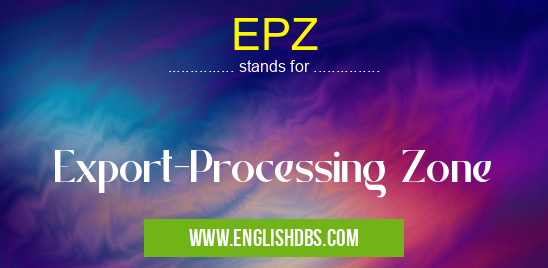What does EPZ mean in INTERNATIONAL BUSINESS
EPZ (Export-Processing Zone) is a designated area within a country, usually near ports, airports, or land borders, where companies can operate with reduced or no tariffs, quotas, or other trade barriers to export their goods. EPZs are also known as free trade zones (FTZs) or special economic zones (SEZs).

EPZ meaning in International Business in Business
EPZ mostly used in an acronym International Business in Category Business that means Export-Processing Zone
Shorthand: EPZ,
Full Form: Export-Processing Zone
For more information of "Export-Processing Zone", see the section below.
Meaning of EPZ in BUSINESS
In the context of business, EPZ refers to a controlled area within a country that allows for the production of goods for export without being subject to the same regulations and taxes as domestic production. EPZs are designed to attract foreign investment and promote economic growth.
Full Form of EPZ
The full form of EPZ is Export-Processing Zone.
What does EPZ Stand for?
EPZ stands for Export-Processing Zone.
Features of EPZs
- Reduced or no import duties on raw materials and components
- Tax exemptions or reductions on profits and exports
- Simplified customs procedures
- Improved infrastructure, such as transportation and utilities
- Access to export markets
- Business-friendly regulations
Benefits of EPZs
- Increased foreign investment
- Job creation
- Export promotion
- Economic growth
- Access to new technologies
- Improved competitiveness
Challenges of EPZs
- Potential for environmental degradation
- Exploitation of labor
- Displacement of local businesses
- Concerns about unfair competition
Essential Questions and Answers on Export-Processing Zone in "BUSINESS»INTBUSINESS"
What is an Export-Processing Zone (EPZ)?
An EPZ is a designated area within a country where businesses can import and export goods without paying taxes or duties. These zones are typically established to promote exports and attract foreign investment.
What are the benefits of operating in an EPZ?
Benefits include:
- Duty-free import and export of goods
- Reduced operating costs due to tax exemptions
- Access to skilled labor and infrastructure
- Simplified customs procedures
- Export-oriented focus can increase competitiveness.
What types of businesses can operate in an EPZ?
Typically, businesses involved in manufacturing, assembly, or export-oriented services are eligible to operate in an EPZ.
How can a company establish a presence in an EPZ?
Companies seeking to establish a presence in an EPZ should contact the relevant authorities in the destination country. They may be required to submit an application and meet specific requirements, such as exporting a certain percentage of their output.
Are there any restrictions on the goods that can be imported or exported through an EPZ?
The types of goods that can be imported or exported through an EPZ may be limited or prohibited by the governing regulations of the zone or the country in which it is located.
How are goods monitored and controlled within an EPZ?
EPZs typically have strict security measures in place to monitor and control the movement of goods, including customs inspections, security cameras, and access restrictions.
How do EPZs contribute to economic development?
EPZs can contribute to economic development by:
- Attracting foreign investment and creating employment opportunities
- Promoting exports and increasing foreign exchange earnings
- Facilitating technology transfer and skill development
- Stimulating economic growth in the surrounding area.
Final Words: EPZs are important economic tools that can attract foreign investment and promote economic growth. However, it's crucial to implement them responsibly to mitigate potential challenges and ensure they contribute positively to the overall development of the country.
